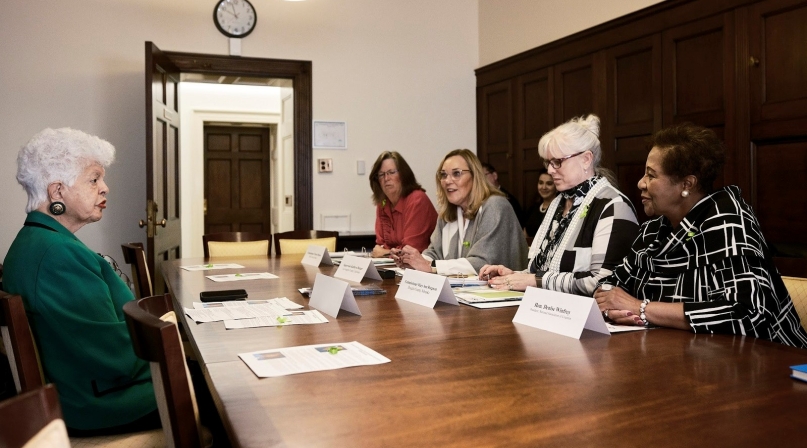Lack of mental health specialists limits treatment

Key Takeaways
With more focus on the scope and scale of the national mental health crisis, counties are pointing to the dearth of trained personnel as the linchpin to tackling the growing problem.
A NACo survey found that 71% of county respondents said that lack of direct service providers was a primary barrier to providing or expanding access to behavioral health systems, with as many indicating that workforce shortage was a major problem. Three-quarters of responding counties saw an increase in incidence of behavioral health conditions over the past year, with nearly 90% noting an increase over five years.
Learn more
Read NACo's mental health survey report
Even in the most populous county in the country, staffing remains challenging.
“We’re competing with ourselves,” Los Angeles County, Calif. Supervisor Kathryn Barger said May 10 at a White House mental health summit of federal and local officials.
“We’re trying to recruit mental health experts, psychiatrists, psychologists, nurses in our jails, and our department of mental health is trying to hire those same people,” she noted. “Our educational system is trying to hire those same people.”
The county is building a recruitment system, which will include loan forgiveness with a commitment to work for the county.
Barger and King County, Wash. Executive Dow Constantine serve as co-chairs of NACo’s Mental Health and Well-being Commission, a 14-person group of county officials that visited Washington, D.C. May 10-11 to meet with Biden Administration officials and members of Congress to share their perspectives on the crisis. The mental health summit convened by the Biden administration is the first such meeting in decades.
It took place amid a rising pressure on people’s mental health across the country. The increasing workload on mental and behavioral health clinicians has compounded over the past few years. In Macon County, N.C., the county is seeing increased turnover in the field, attributed to low pay, a high cost of living and high patient loads. McLean County, Ill.’s behavioral healthcare agencies total more than 100 job openings. That leads to situations like in Roscommon County, Mich., where two to three-month waits for appointments with mental health care specialists are becoming the norm, with residents unable to access care within a reasonable amount of time.
Constantine described King County’s new behavioral health apprenticeship program that it designed with its behavioral health workers union. Combining flexible course requirements and on-the-job training, it provides financial incentives to employers. The county invested $4 million in the program, along with $1.5 million from the state and $5 million from the Ballmer Group.
“We knew from our discussions with our labor partners that our workers are really living on the edge,” Constantine said. “They’re undercompensated historically, and we have a high cost of living. We have behavioral healthcare workers who themselves are on the verge of becoming homeless. Obviously, that is unsustainable.”
That prompted the county’s Crisis Care Centers Levy, a nine-year initiative that will raise $1.25 billion to fund five crisis care centers, offering same-day access to care for a person in crisis and diverting many from the county jail and rebuilding community-based residential treatment.
“Of course, this should be statewide and of course, it should be nationwide, but like many of you, we don’t feel we can wait, so we’re moving forward now,” Constantine said. The levy passed with more than 56% approval in April.
“Making workforce a central issue in this levy helped with its success,” he said. “People understood that it takes people to treat people. As we take the next steps forward, we’re committed to ensuring this measure delivers by promoting career pathways across higher education, credentialing, training and wrap-around supports for these employees.”
And, as the labor force braces for growing adoption and adaptation of artificial intelligence, Constantine stressed that the work of mental and behavioral health workers will always be relevant.
“Treatment can’t happen without access, engagement and diagnosis and in behavioral health, those things are intensely human endeavors,” he said. “So much depends on someone bringing their experience and their skills to identify sometimes unseen needs and develop a treatment plan.”
Mental and behavioral health issues are especially prevalent in jails, where counties carry the bill for treatment even before adjudication.
“Within our jails, we have the sickest of the sick,” Barger said. “We recognize that it’s not sustainable to continue to warehouse.”
Los Angeles County has worked to expand the reach of its Office of Diversion and Reentry, with the Board of Supervisors voting in May to add 1,750 new beds.
Los Angeles County has benefited from the Centers for Medicare and Medicaid Services waiver that now covers services in California jails 90 days prior to release. That relief from providing services is allowing the county to take the $455 billion it had allocated for those services to fill in other gaps in services.
“With this waiver, we’re going to be able to build that continuum of care,” Barger said.
Attachments
Related News

House Agriculture Committee introduces 2026 Farm Bill
On February 13, House Agriculture Committee Chairman G.T. Thompson (R-Pa.-15) introduced the House version of the 2026 Farm Bill, the Farm, Food, and National Security Act of 2026.

USDA and HHS release new dietary guidelines
On January 7, U.S. Department of Agriculture Secretary Brooke Rollins and U.S. Department of Health and Human Services Secretary Robert F. Kennedy, Jr. unveiled the new Dietary Guidelines for Americans, 2025–2030.
